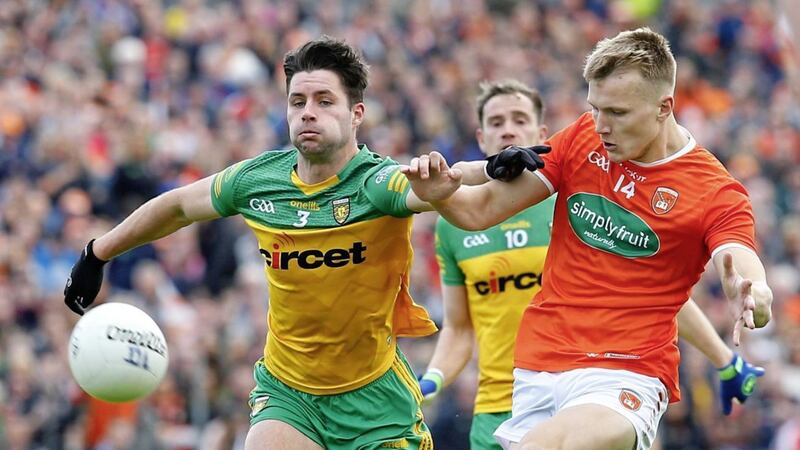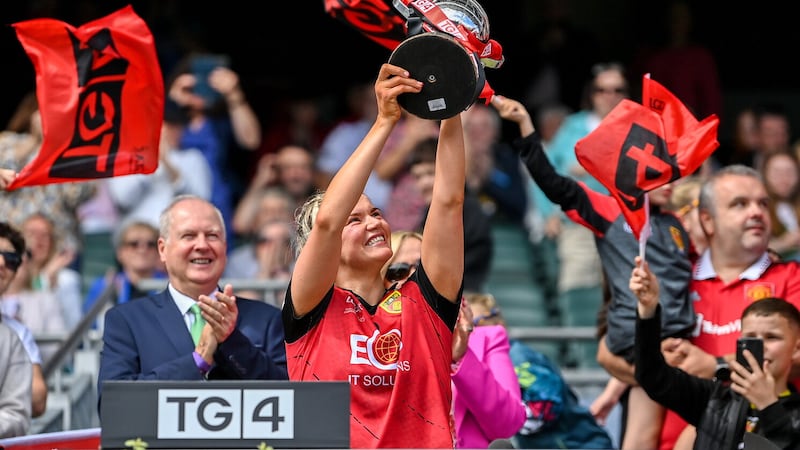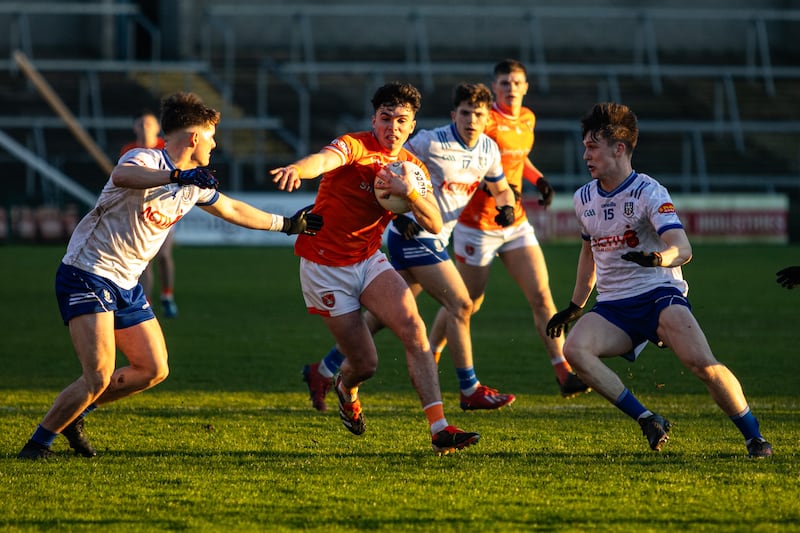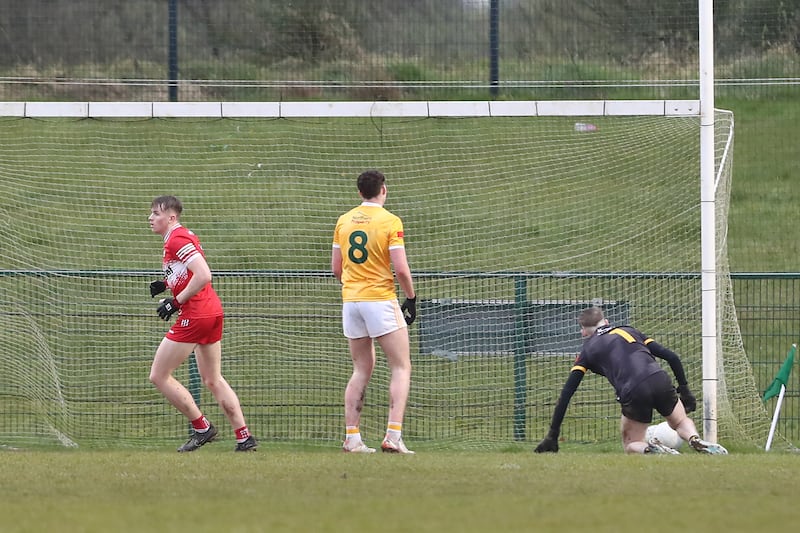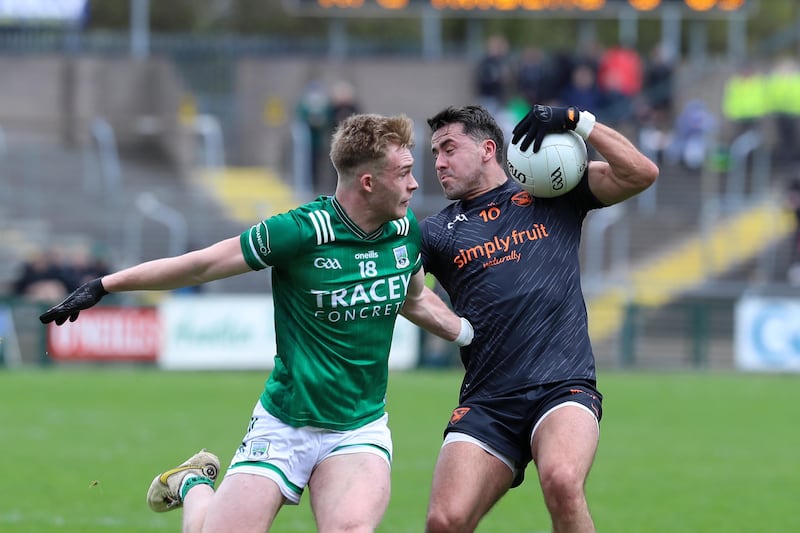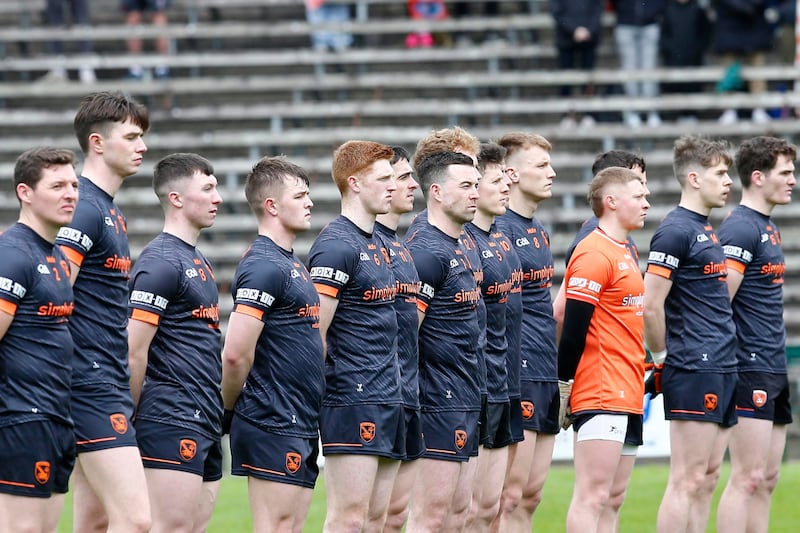AFTER Kevin McKernan announced his retirement a couple of weeks ago I found myself watching the 2010 All-Ireland final between Down and Cork over again.
It was a match that swung from end-to-end over 70 exciting minutes and every single ball was contested. I had to conclude that football was better to watch back then.
The ball was moved forward quickly, the pace never slackened, it was more physical, it was more off-the-cuff and, for me, it was a more entertaining spectacle. But that’s just me.
I had an email recently from a Derry fan who staunchly defended his county’s lambasted defensive tactics in the Ulster final. From the start, the Oak Leafers pinned their colours to the mast and dragged every man-jack behind the ball to set the tone for a game that was engrossing if you were in Clones but just gross according to many who watched it on TV.
Opinion depended on the result.
Your team loses by a point: Never seen worse, need to get rid of yer man, I’ll never be back.
Your team wins by a point: Tactical masterclass, manager is a genius, when’s the next game?
“If your team comes out on the right side of a tussle like that you will probably be happy enough as I am,” read the email.
“People are saying you couldn't watch it... I can watch it the best. The Ulster final score in ’93 was eight points to six. Donegal scored 1-14 this year and were beaten.
“What might be a revealing thing would be to add up all the Ulster Championship score totals for a season in the 1990s, or noughties when they were supposedly attacking football and I would bet with anybody that the score average is higher today.”
Challenge accepted. After painstaking research over countless hours in the dusty archives of Wikipedia during which I asked myself several times: ‘What in the name of God did I start this for?’ I can now reveal my findings.
Love it or hate it, today’s brand of football is higher scoring than it was back in the day. Starting in 1990 and continuing to this year’s Ulster Championship, there is a swing of 16.2 points per game from the low-point of the 2006 Ulster Championship (23.4 scores a game on average) to the veritable scorefest of last year when 16 goals and 269 points were scored over eight games, that’s an average of a shade under 40 points a match.
Yes, some counties pull everybody back and set up looking for turnovers but the conditioning, athleticism and skillset of the players these days from one to 15 means that there are more scores per game than ever before. The worm began to turn in 2016 – a season that included a remarkable semi-final replay between Tyrone and Cavan that finished with an aggregate of 7-35 – and the average scores per games has been well above 30 ever since.
So football is more high-scoring now, end of debate.
But is it a better spectacle? That’s another debate.
1990: 28 scores per game (18-198 in nine games)
1991: 26.3 (12-201 in nine games)
1992: 29.4 (17-243 in 10 games)
1993: 27.6 (23-262 in 12 games)
1994: 28.4 (17-176 in eight games)
1995: 27.25 (10-188 in eight games)
1996: 26.25 (10-180 in eight games)
1997: 29.8 (26-249 in 11 games)
1998: 26.34 (8-187 in eight games)
1999: 29.3 (17-213 in nine games)
2000: 27.6 (17-197 in nine games)
2001: 29.2 (18-209 in nine games)
2002: 30 (19-213 in nine games)
2003: 27.3 (16-225 in 10 games)
2004: 30.7 (18-222 in nine games)
2005: 27.75 (22-261 in 12 games)
2006: 23.4 (11-201 in 10 games)
2007: 28.7 (16-210 in nine games)
2008: 29.8 (18-244 in 10 games)
2009: 25.75 (8-182 in eight games)
2010: 29.4 (13-196 in eight games)
2011: 28.3 (17-175 in eight games)
2012: 29.75 (13-199 in eight games)
2013: 25.75 (8-182 in eight games)
2014: 31.9 (22-253 in 10 games)
2015: 27.6 (7-200 in eight games)
2016: 33.4 (23-265 in 10 games)
2017: 35 (14-238 in eight games)
2018: 34.5 (14-234 in eight games)
2019: 37.13 (17-285 in nine games)
2020: 31.6 (10-223 in eight games)
2021: 39.6 (16-269 in eight games)
2022: 34.5 (14-234 in eight games)
--
IN sport it’s very rare for players to bow out the way they want to and those who get the ending they deserve are few and far between.
Watching Michael Murphy last Sunday, I had the feeling that I didn’t want him to play on for much longer in a Donegal side that seems to have lost its way. He had the look of a man who was frustrated by no longer being able to do the things he could, things that came easily from the moment he joined the Donegal panel.
Brian McIver was the man who called him up and he spoke recently about Murphy’s impact on the Donegal panel when he emerged as a teenager.
“He came with a totally different attitude of how football should be played and approached and the rest is history,” said Brian.
“I would say Michael Murphy coming in changed Donegal football because his attitude was so good, it was absolutely brilliant. As a 17-year-old lad he had no fear of anybody. He had no fear of taking on anything.”
For years Murphy was the best player in Ireland and (although it’s a back-handed complement) I detest hearing him booed when he stands over a free. He could play anywhere from full-back to midfield to full-forward and he was a leader too, someone who made the players around him better and made things happen by his very presence.
This season, against Cavan in the Ulster semi-final, he gave Paddy McBrearty a pass on the right wing. McBrearty had struggled to get into the game but along with the ball Murphy gave him something intangible – the confidence to have a go. McBrearty kicked a superb point.
Afterwards there was the usual debate in the press box over who’d been man of the match and all agreed that it was Murphy again – same as he’d been man of the match for Donegal in just about every game for 15 years.
Donegal have leaned heavily on him over those years and the workload seems to be weighing the great man down. Last Sunday against Armagh he gave all he had but couldn’t turn the tide.
If he returns next season I hope he has his best season ever but time waits for no man, not even Michael Murphy.
